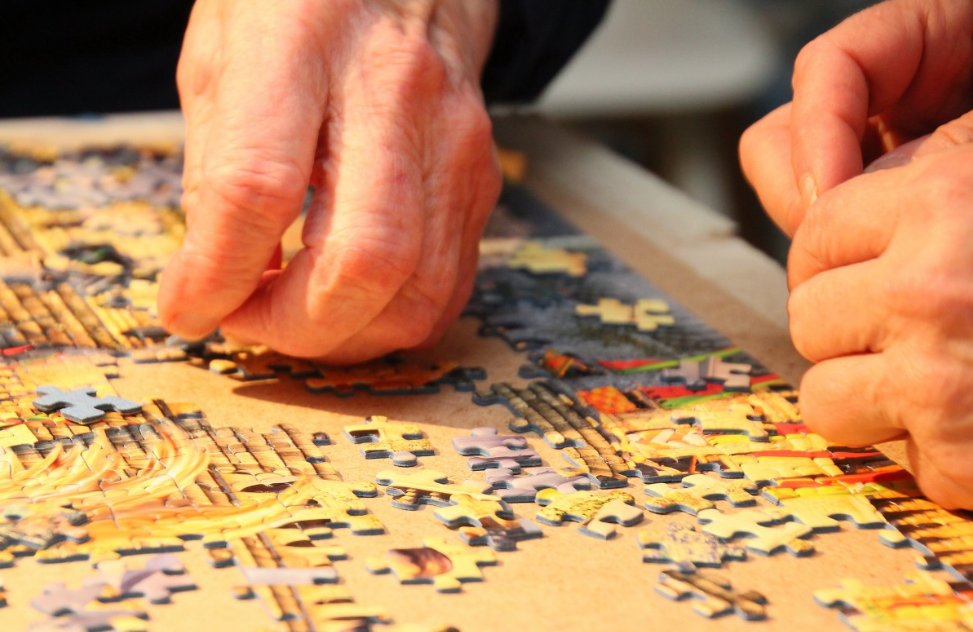I bought a jigsaw puzzle at the grocery store today. The box features an ornate cathedral with red roses and blossoming foliage. The cathedral is in Germany. The puzzle cost two bucks.
My mother and I used to do jigsaw puzzles. Big puzzles. We did them together. I was no good at jigsaws, but she was an expert.
Long ago, puzzles cost seventy-five cents, and provided hours of distraction. We needed distractions back then. We welcomed anything that took our minds off my father’s untimely death, and the gloom that came thereafter.
My mother looked for distractions that made us laugh, things that made us smile, games, puzzles, crafts, or road trips.
Once, she took us to Branson. She took me to see a Dolly Parton impersonator. The show was spectacular. After the performance, the woman in the blonde wig hugged me so tight she nearly suffocated me with her enormous attributes.
When my mother saw me locked with the buxom woman, she shrieked and started praying in tongues. She yanked me by my earlobe and drug me away. And I have been a lifelong Dolly Parton fan ever since.
Anyway, my mother loved doing things with her hands. She made large quilts from old T-shirts, she gardened, she did puzzle books, anagrams, crosswords, cryptograms, she knitted, crocheted, and painted.
She played cards with me, sometimes checkers, and she was a Scrabble fanatic. But jigsaw puzzles. Those were our thing.
My mother started each puzzle by saying the same thing:
“We gotta find the corners first, that’s how you do it.”
The idea was that once you found the corners, the rest of the puzzle would come together. Thus, we would sift through twenty-five hundred pieces, looking for four corners. Once we found them, we’d dig for the edges.
We’d place pieces into piles, then link them together. Piece by piece. Section by section. Mama and I could spend a full week on a good puzzle. Sometimes longer.
And we would talk. After all, that’s what puzzle-people do. They talk. My mother would talk about ancestors, tales of childhood, about her mother, about the Bible. And while we concentrated, she would explain life to me.
I remember one day, working on a puzzle. She stopped working. She looked at me. Her eyes were glassy. And there was obviously something she wanted to say. Something important.
She said, “You know, you’re gonna grow up one day, and you’re gonna soar.”
It was a bizarre thing to say. And it was followed by strange silence. I quit searching for pieces. So did she. Her words hung in the air like the smell of bread. She took my hand.
She went on, “One day you’ll forget all the horrible things your daddy put us through, and you’re just gonna soar. Hear me? Soar.”
It was all she said. She removed her glasses and wiped her face. And we went back to searching for puzzle pieces.
I did not think I would do anything with my life. I dropped out of school before eighth grade, I worked pathetic jobs. I once scooped ice cream for a living. That was my actual job. Ice cream.
I threw the newspaper, laid tile, hung sheetrock, pulled electrical wire, drove a commercial mower, and played piano for church choir.
But none of this has ever mattered to my mother. To her, I was flying. She was proud of me no matter what I was, or what I wasn’t. Whether I dug drainage ditches with a serving spoon, or graduated from community college with honors, I was her son.
Today, I dumped a five-hundred-piece puzzle on my kitchen table. I found the corners first. And I thought about the way our lives went.
The day my father took his life, my mother was angry at him. She was angry at the universe for letting it happen. And I was angry with God for letting that happen to her. I wasn’t fuming mad, mind you, but I was sour inside.
But I think I see things more clearly now. Our lives have been one giant puzzle. And maybe that’s how everyone’s life is. The pieces don’t make sense when they aren’t together, but you don’t give up looking. Not ever.
My mother helped me find the corners first. My wife, my family, and my friends helped me find the edges. And so, the twenty-five-hundred-piece puzzle gets put together by an Unseen Hand. And even though it resembles a big cardboard mess before it’s done, it’s no mess. It’s perfect.
I don’t have much to write today. Nothing except to say: sometimes I feel like I am soaring.
Sean Dietrich is a columnist and novelist known for his commentary on life in the American South. He has authored nine books and is the creator of the “Sean of the South” blog and podcast. The views and opinions expressed here are those of the author and do not necessarily reflect the policy or position of 1819 News. To comment, please send an email with your name and contact information to Commentary@1819News.com.
Don’t miss out! Subscribe to our newsletter and get our top stories every weekday morning.










